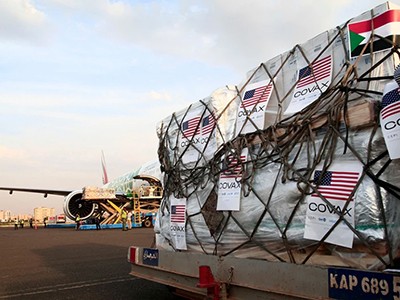
Researchers and policymakers need to investigate alternatives to a climate COP-like process for pandemic response and prevention.Credit: Mohammed Abed/AFP/Getty
The global response to COVID-19 represented a “catastrophic failure of the international community in showing solidarity and equity”. This frank assessment comes in the opening line of the first, or ‘zero’, draft of a new international pandemic agreement, published by the World Health Organization (WHO) last week. The agreement is intended to help the world to better prepare for future pandemics. Negotiations over the details are due to start later this month and are likely to last at least a year.
Although it doesn’t say so explicitly, the WHO’s statement can be read as a rebuke to the leaders of high-income nations, highlighting the fact that their response to the ongoing pandemic has not been a model of cooperation or compassion. A promise to properly support a vaccine-distribution scheme called COVAX went unfulfilled, undermining its potential. Rich countries over-ordered and hoarded vaccines, stopping them from reaching people in other countries who needed them. Some of the world’s best-known and well-respected pharmaceutical companies fought to stop intellectual property (IP) being shared. Had they not done so, more manufacturers could have produced vaccines and treatments, and more lives could have been saved. The treaty drafted by the WHO is intended to ensure that this behaviour is never repeated. But as Nature has argued before, a treaty on its own offers no guarantee that promises will be kept.
Share and share alike
The draft text encourages the waiving of applicable IP rights for a defined period during a pandemic. In addition, at least one-fifth of relevant vaccines must be deposited with the WHO, to ensure that sufficient numbers reach the world’s poorest and most vulnerable people at the same time as they reach people in richer countries. Prices and contracts should be made public — something that didn’t happen during the COVID-19 pandemic, allowing countries to outbid each other for vaccines by offering higher prices that only pharmaceutical companies were a party to.
What the WHO’s new treaty could mean for the next pandemic
The current wording also recognizes the importance of open science and the sharing of data such as viral genome sequences. Last month, the WHO urged China’s authorities to share sequence data, as well as information on cases, hospitalizations and vaccination rates. Another point emphasized in the zero draft is that countries that share their scientific knowledge — as many low-income countries did during the pandemic — should also share in the benefits.
All of this is necessary and overdue, and has the backing of scientists and campaigning organizations. But researchers are rightly concerned about the lack of clarity on how the treaty will work in practice, and how signatories will be held to their promises. The WHO recommends that countries make decisions through a conference of the parties (COP), a democratic forum in which all countries have an equal voice in decision-making.
But COPs are expensive to run, and the creation of such a framework would mean that the WHO — which faces a constant struggle to get countries to fund it properly — would struggle even more. COPs also take their time to reach decisions, as we know all too well from those governing international action on concerns such as climate change and biodiversity loss.
Perhaps most important of all, a forum of 200-odd countries, plus tens of thousands of observers and lobbyists, is, arguably, not the best way to ensure that an agreement is adhered to, especially when the onus for action lies with a relatively small number of high-income nations. There’s good evidence from the climate-change COP process that even legally binding agreements cannot compel nations to meet their commitments.
Even after COVID, the world’s vaccine strategy is failing
Sensibly, the WHO wants countries to agree on some kind of monitoring system — a way to get them to report back on whether promises on funding, IP or vaccines are being kept. But negotiators and their teams would also be well advised to explore alternative ways of achieving the agreement’s aims. Researchers who study the impact of international treaties could advise on other potential models.
It’s clear from the WHO’s zero draft text that the agency is determined to avoid a repeat of some of the worst of the behaviours seen during the pandemic. And it is reassuring to see, throughout the text, encouragement for governments and companies to be transparent and willing to share, particularly when it comes to know-how and products that are based on publicly funded research. Had this happened previously, the coronavirus pandemic might well have been behind us by now.
The world has little more than a year to convert the draft into finished text. The commitments in the current version will probably be watered down before an agreement is reached. But as researchers prepare to publish their studies, and campaigners rush to accelerate campaigning, it is easy to forget the need to determine the kinds of institution and structure that are essential to ensuring an agreement is delivered on. Institutional structures are as important as the content of treaties. The WHO and national negotiators need to ask themselves what value an agreement has if it includes everything in the WHO’s zero draft, but proves unworkable in practice.

 What the WHO’s new treaty could mean for the next pandemic
What the WHO’s new treaty could mean for the next pandemic
 Unseating big pharma: the radical plan for vaccine equity
Unseating big pharma: the radical plan for vaccine equity
 The world must learn from COVID before diving into a pandemic treaty
The world must learn from COVID before diving into a pandemic treaty
 The WHO deserves more money for its core mission — and more respect
The WHO deserves more money for its core mission — and more respect
 Even after COVID, the world’s vaccine strategy is failing
Even after COVID, the world’s vaccine strategy is failing
 Time is running out for COVID vaccine patent waivers
Time is running out for COVID vaccine patent waivers





